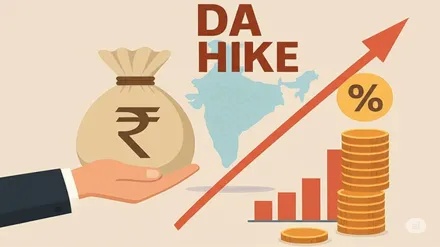
Significant Dearness Allowance Increase for Central Government Staff
Central government employees and pensioners are set to receive a 3% increase in Dearness Allowance (DA) for the July-December 2025 cycle, marking a notable improvement over the previous 2% hike in January 2025. This adjustment, expected to be announced around Diwali, will raise the DA rate from 55% to 58%, providing additional financial relief during the festive season. The decision aligns with the formula-based calculation tied to inflation data, ensuring that salary adjustments reflect the rising cost of living. Employees have expressed mixed reactions, with some welcoming the increase while others remain cautious about long-term financial stability. The DA revision, which occurs biannually, is a critical component of the 7th Pay Commission framework, designed to maintain purchasing power amid inflationary pressures.
Calculating DA: The Role of CPI-IW Data
The DA hike is determined through a specific formula that incorporates the All-India Consumer Price Index for Industrial Workers (CPI-IW). For the July-December 2025 cycle, the CPI-IW for June 2025 stood at 145, with an average of 143.6 for the 12-month period ending June 2025. Applying the formula DA (%) = [(CPI-IW average × 2.88) – 261.42] ÷ 261.42 × 100, the calculation yields a 58.2% DA rate, which is rounded down to 58%. This method ensures that DA adjustments are systematically tied to inflation trends, balancing the need for employee compensation with fiscal responsibility. The 3% increase represents a strategic move to address inflationary gaps while adhering to established economic benchmarks.
Timing of the DA Announcement and Pay Commission Delays
The government typically announces DA hikes in September or October, coinciding with the festive season to provide immediate financial relief. This year’s announcement is anticipated around Diwali, ensuring employees receive the benefits from July 1, 2025. However, the 8th Pay Commission, which has been in the planning stages since January 2025, remains stalled. Despite initial promises to finalize Terms of Reference by April 2025, no progress has been made, raising concerns about delays in future salary reforms. Historical data suggests it could take 18–24 months for the 8th Pay Commission’s recommendations to be implemented, potentially extending the current DA structure until 2027. This delay underscores the need for timely reforms to address the evolving economic landscape.
Impact on Employees and Long-Term Implications
The 3% DA hike is expected to benefit over 1 crore central government employees and pensioners, offering a temporary reprieve from inflationary pressures. While the increase is welcomed, experts caution that it may not fully offset rising living costs, especially with the 8th Pay Commission’s delayed reforms. Employees have been advised to monitor the final announcement for details on implementation and any additional benefits. The 7th Pay Commission’s final scheduled hike will be its last, as its term expires on December 31, 2025. This highlights the critical role of timely pay commission reforms in safeguarding the financial well-being of public sector workers. Until the 8th Pay Commission’s recommendations are finalized, the current DA structure will remain in place, emphasizing the importance of proactive policy-making in public administration.
Conclusion: Balancing Inflation and Fiscal Responsibility
The recent DA hike reflects a delicate balance between addressing inflationary pressures and maintaining fiscal discipline. While the 3% increase provides immediate relief, the broader implications of delayed reforms underscore the need for timely policy interventions. As the 7th Pay Commission’s tenure comes to an end, the unresolved status of the 8th Pay Commission raises questions about the sustainability of current compensation structures. Employees and pensioners are urged to stay informed and engaged, as their financial security hinges on the timely resolution of these critical issues. The government’s approach to DA adjustments and pay commission reforms will continue to shape the economic landscape for central government staff in the coming years.




